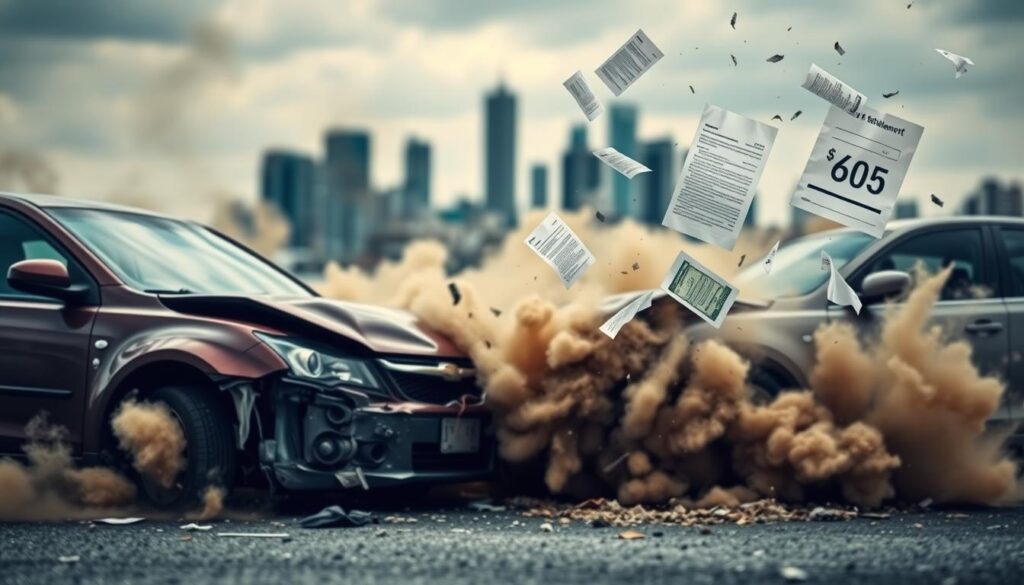In 2021, over 5.5 million car accidents happened in the United States, causing an estimated $242 billion in economic losses. These numbers underscore the urgency for those involved in car accidents to grasp their legal rights. Understanding your car accident settlement rights is vital. It ensures you get the compensation you deserve for your damages, injuries, and other losses.
Key Takeaways
- Car accident settlements are essential for obtaining fair compensation for damages, injuries, and other losses.
- Understanding your legal rights is crucial to navigating the settlement process effectively.
- Settlements can cover a wide range of expenses, from medical bills to lost wages and pain and suffering.
- Knowing the timeline and key components of settlement agreements can help you make informed decisions.
- Seeking legal representation can significantly improve your chances of securing a favorable settlement.
What Defines a Car Accident Settlement
A car accident settlement is a legally binding agreement between parties involved. It resolves the claim without going to court. This agreement outlines the compensation for collision damages, medical expenses, lost wages, and other costs. The goal is to provide a fair and timely resolution, avoiding the lengthy process of a negligence lawsuit.
Types of Settlements Available
Several types of car accident settlements can be reached, including:
- Lump-Sum Settlement: A one-time payment for all damages, past, present, and future.
- Structured Settlement: Periodic payments made over a set time frame.
- Partial Settlement: An agreement that resolves part of the claim, with the rest to be addressed later.
Key Components of Settlement Agreements
Settlement agreements detail the total compensation, liability, and the scope of the release. These elements ensure both parties understand the settlement terms and their rights and obligations.
Timeline Expectations for Settlements
The time to reach a settlement varies, based on case complexity and negotiation willingness. Simple cases may settle in a few months. However, more complex disputes with extensive damages or liability issues can take a year or more to resolve.
Immediate Steps After an Auto Collision
After a car accident, it’s vital to act swiftly to protect your rights and enhance your settlement claim. Gathering evidence and seeking medical help are key steps. These actions can greatly influence your case’s outcome.
Contacting the police and filing a report is a crucial first step. This documentation captures essential details like the accident’s location, time, and contributing factors. The police report also includes witness statements and other valuable information for accident reconstruction.
- Collect photographic evidence: Take pictures of the accident scene, vehicle damage, and any injuries. These images are crucial for accident reconstruction and settlement negotiations.
- Seek medical attention: Even if you think you’re not seriously hurt, get a medical check-up right away. Some injuries, like whiplash, may not show up immediately. Early medical care links the accident to any health issues, vital for settlement claims.
- Document everything: Record all accident-related expenses, including vehicle repairs, medical bills, and lost wages. This documentation is key for negotiating a fair settlement with the insurance company.
By taking these immediate actions, you lay the groundwork for a stronger accident reconstruction case. This increases your chances of a fair vehicle repair costs settlement. Remember, acting fast and collecting the right evidence can significantly impact your claim’s outcome.
Your Legal Rights Following a Vehicle Accident
Being involved in a car accident means you need to know your legal rights. This part covers what you’re entitled to, including state laws on settlements, time limits, and the right to a lawyer.
State-Specific Settlement Laws
Every state has its own rules for personal injury claims and auto insurance payouts. It’s vital to learn about these laws in your state. They affect how your case is settled, from who’s liable to how much you can get.
Statute of Limitations
The statute of limitations is a key factor in personal injury cases. It varies by state and sets a time limit to file a lawsuit after an accident. If you miss this deadline, you might lose your chance for compensation. So, it’s important to act quickly and get legal advice.
Right to Legal Representation
As a victim, you have the right to legal help. A skilled personal injury lawyer can guide you through the settlement process. They protect your rights and work to get you the best compensation. They also deal with insurance companies, helping you avoid mistakes and get a fair deal.
Knowing your legal rights after a car accident helps protect your interests and get the compensation you deserve. Don’t wait to explore your options and get professional advice to handle this process well.
Determining Liability in Auto Accidents
Establishing liability in car accidents is a critical step in determining the settlement outcome. Liability is determined by examining factors like traffic laws, eyewitness accounts, and expert testimony. This section will explore the key elements that contribute to the liability determination process.
Adherence to traffic laws is a primary factor in assessing liability. Investigators look at whether drivers violated any traffic regulations, such as speeding or running a red light. These violations can directly impact the determination of negligence, a crucial component of negligence lawsuits.
Eyewitness accounts also play a significant role in liability determination. Testimonies from witnesses can provide valuable insights into the sequence of events and the actions of drivers. These accounts can corroborate or challenge the narrative presented by the parties involved.
Expert testimony from accident reconstruction specialists, engineers, or medical professionals can further inform the liability assessment. These experts analyze physical evidence, such as skid marks and vehicle damage, to reconstruct the accident. They identify the contributing factors.
By carefully examining the evidence and considering various factors, the liability determination process helps establish the degree of culpability for each party involved. This information is crucial in shaping settlement negotiations and the potential compensation awarded to the injured party.
How Insurance Companies Calculate Car Accident Settlement
Understanding how insurance companies calculate car accident settlements is crucial. It ensures you get the compensation you deserve. The process involves evaluating property damage, assessing medical expenses, and calculating lost wages. These factors are the core of the settlement calculation.
Property Damage Evaluation
The first step is evaluating the damage to your vehicle. Insurance companies send an adjuster to inspect and estimate the vehicle repair costs. They consider the car’s age, make, model, and damage extent. The aim is to restore your vehicle to its pre-accident state, a key part of the auto insurance payouts.
Medical Expenses Assessment
Medical expenses are another critical factor. Insurance companies review all medical bills and records from the accident. They aim to cover the total cost of your treatment, including hospital stays, doctor visits, and rehabilitation. This ensures your medical expenses are fully covered in the settlement.
Lost Wages Computation
Insurance providers also consider lost income due to the accident. This includes time off for medical treatment and future earnings impacts. The lost wages computation aims to compensate for the financial burden. It helps you focus on recovery without worrying about lost income.
Understanding these factors helps you advocate for your rights. It ensures you receive the compensation you’re entitled to. Remember, insurance companies aim to minimize payouts. Being informed and prepared is key when negotiating your settlement.
Understanding Pain and Suffering Compensation
The concept of pain and suffering compensation in car accident settlements is complex and often misunderstood. It extends beyond economic damages like medical bills and lost income. It focuses on the emotional and physical pain the victim endures.
Several factors are considered to determine pain and suffering compensation. These include the injury’s severity, the recovery time, and the impact on the victim’s life. Proving pain and suffering requires strong evidence, such as medical records, witness statements, and personal accounts.
The multiplier approach is a common method to calculate pain and suffering compensation. It multiplies the total economic damages by a factor, usually between 1.5 and 5. The multiplier can be influenced by several factors:
- The degree of fault attributed to the at-fault party
- The severity and duration of the victim’s injuries
- The anticipated recovery time and long-term impact on the victim’s life
Understanding pain and suffering compensation is key for those pursuing personal injury claims after a car accident. Knowing the factors and methods used can help individuals advocate for their rights. This ensures they receive the settlement they deserve.

Documentation Required for Maximum Settlement
Understanding the car accident settlement process can be challenging. However, collecting the right documents is key to getting the maximum compensation you deserve. Whether you’re looking for coverage for medical expenses or collision damages, a thorough documentation trail is crucial.
Medical Records and Bills
Keeping accurate records of medical expenses is vital. You should gather detailed records of all treatments and costs related to your injuries. This includes hospital bills, doctor’s notes, and rehabilitation invoices.
Police Reports and Witness Statements
An official police report detailing the accident’s circumstances is essential. It serves as strong evidence for your settlement claim. Also, collect statements from witnesses who saw the incident. Their testimonies can support your version of events.
Evidence of Lost Income
If your injuries have caused you to miss work, document any lost wages. This includes pay stubs, tax returns, and letters from your employer confirming your time off and lost income.
By gathering this detailed documentation, you’ll be better equipped to negotiate a fair and maximum settlement. This will ensure your medical expenses and collision damages are fully covered.
Negotiating with Insurance Adjusters
Dealing with car accident settlements can be challenging, yet it’s vital for a fair auto insurance payout. When negotiating with adjusters, a strategic approach and knowledge of your rights are key.
Being patient and persistent is crucial. Insurance companies often start with a low-ball settlement, hoping you’ll settle quickly. However, a well-documented case can lead to a higher payout.
- Thoroughly review your insurance policy to understand your coverage and rights
- Gather all relevant documentation, including medical records, bills, and proof of lost wages
- Communicate clearly and confidently with the insurance adjuster, providing a detailed breakdown of your damages
- Be prepared to counter-offer and negotiate, rather than simply accepting the initial offer
Seeking help from an experienced attorney can be beneficial. They can handle the settlement process, protecting your rights and ensuring you get the compensation you deserve.
Common Mistakes to Avoid During Settlement Process
Handling personal injury claims and car accident settlements requires careful navigation to maximize your recovery. Many individuals make common mistakes that can harm their settlement negotiations. It’s important to avoid these pitfalls during this critical phase.
Accepting Early Settlement Offers
One frequent error is accepting early settlement offers from insurance companies. These offers might seem appealing, but they usually undervalue your rightful compensation. Insurance companies may exploit your immediate financial needs. It’s crucial to resist these offers and wait for a thorough evaluation of your personal injury claims and car accident settlement potential.
Overactive Social Media Presence
In today’s digital world, social media can significantly impact your settlement negotiations. Refrain from posting anything related to your accident or injuries on platforms like Facebook, Twitter, or Instagram. Insurance adjusters often search these sites for information that could weaken your personal injury claims.
Missing Documentation Deadlines
Accurate documentation is key to a strong case for your car accident settlement. Make sure to submit all necessary medical records, police reports, and evidence of lost income on time. Missing these deadlines can lead to delays or claim rejection.

Avoiding these common mistakes can significantly improve your chances of getting a fair settlement. This settlement should adequately compensate you for your losses and support your recovery.
When to Accept or Reject a Settlement Offer
Dealing with a car accident settlement can be overwhelming. Yet, knowing when to accept or reject an offer is key. This choice affects your financial and personal life deeply. It’s not something to take lightly.
When looking at a settlement offer, consider these points:
- Adequacy of the Offer: Check if the settlement amount covers your medical bills, lost wages, and other accident-related damages. If it doesn’t, think about rejecting it and negotiating more.
- Long-term Implications: Think about the settlement’s long-term effects. Will it cover future medical costs or ongoing care? A low offer might leave you financially strained later on.
- Statute of Limitations: Remember your state’s time limit for personal injury claims. Rejecting an offer might limit your time to sue, so consider this carefully.
- Negotiation Potential: If the first offer is not good, try negotiating with the insurance company. Or, seek legal help to get a better deal.
Deciding to accept or reject a settlement should be well thought out. It’s based on your unique situation and legal advice. Knowing your rights and the factors at play helps you make a choice that protects your interests.
The Role of Legal Representation in Settlements
Legal representation is crucial in negligence lawsuits and personal injury claims. Studies indicate that accident victims with attorneys often receive higher settlements than those without legal aid.
The Insurance Research Council found that individuals with lawyers received settlements 3.5 times higher on average. Similar results were seen in medical malpractice and workers’ compensation cases. Claimants with attorneys received three times more compensation.
Several factors influence settlement amounts. These include the injury’s severity, property damage extent, and the negotiation skills of the legal team. This underscores the value of an experienced attorney in navigating the legal system and maximizing compensation.
- Lawyers have a deep understanding of the law and can help you build a stronger case.
- They know how to effectively negotiate with insurance adjusters and other legal professionals.
- Attorneys can ensure that all necessary documentation is in order and that you receive the full compensation you are entitled to.
Seeking legal representation is especially beneficial in contested negligence cases, severe injuries, or low insurance offers. With an advocate, you can increase your chances of receiving a fair and just settlement.
Alternative Dispute Resolution Options
Resolving car accident disputes doesn’t always require going to court. Mediation and arbitration are two alternatives that offer unique benefits over traditional litigation.
Mediation Process
Mediation involves a neutral third-party facilitator helping parties find a settlement. This approach fosters open communication and focuses on practical solutions. It can lead to a more satisfactory outcome for both sides, saving time and money compared to court battles.
Arbitration Benefits
Arbitration is another effective method for car accident settlements. A neutral arbitrator reviews evidence and makes a binding decision. It’s faster and cheaper than litigation, ensuring a fair evaluation. The privacy of arbitration proceedings also appeals to parties involved.
FAQ
What defines a car accident settlement?
A car accident settlement is a legally binding agreement. It occurs when the at-fault party or their insurance pays the victim for damages and injuries. This payment covers losses from the accident.
What are the key components of a settlement agreement?
The main parts of a settlement agreement include the total amount to be paid and how it’s divided. It also includes a release of liability and the payment schedule.
What is the typical timeline for reaching a car accident settlement?
The time it takes to settle a car accident case varies. It depends on the case’s complexity, injury severity, and negotiation willingness. Settlements can take months to years to finalize.
What are the immediate steps I should take after a car accident?
After a car accident, take these steps: Call the police and report the accident. Seek medical attention, even for minor injuries. Document the scene with photos and witness statements. Notify your insurance provider.
How is liability determined in a car accident case?
Liability is determined through a detailed investigation. It considers traffic laws, eyewitness accounts, physical evidence, and expert testimony. The negligent party is held liable for damages and injuries.
How do insurance companies calculate car accident settlement amounts?
Insurance companies calculate settlements based on several factors. These include property damage, medical costs, lost wages, and pain and suffering. They also consider fault and evidence strength.
What is “pain and suffering” compensation in a car accident settlement?
Pain and suffering compensation covers non-economic damages. This includes physical pain, emotional distress, and reduced quality of life. The amount is based on injury severity and daily life impact.
What documentation is required to support a car accident settlement claim?
To maximize your settlement, provide detailed documentation. This includes medical records, police reports, witness statements, and proof of lost income. Comprehensive record-keeping is key to showing your damages.
How do I effectively negotiate with insurance adjusters?
When negotiating, communicate clearly and provide strong evidence. Be ready to make counteroffers. If negotiations are tough, consider a personal injury attorney’s help.
What are some common mistakes to avoid during the car accident settlement process?
Avoid common mistakes like accepting early offers without understanding them. Also, avoid inappropriate social media activity and missing documentation deadlines.
How do I know when to accept or reject a settlement offer?
Evaluate the offer based on total compensation, damage coverage, and fairness. If it’s not fair, negotiate further or seek legal action.
How can legal representation benefit my car accident settlement?
Hiring a skilled personal injury attorney can greatly improve your settlement chances. They navigate the legal process, negotiate with insurers, and protect your rights.
What are the benefits of alternative dispute resolution options for car accident settlements?
Methods like mediation and arbitration offer a quicker, cheaper way to settle disputes. They provide flexibility, privacy, and control over the outcome, within a structured framework.
